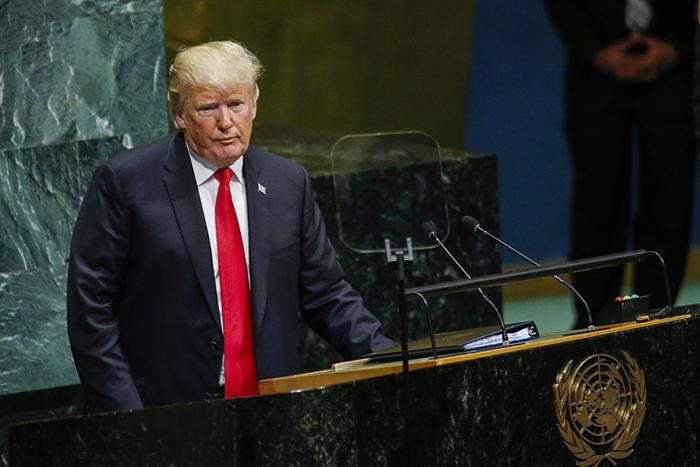New York Correspondences
6 March 2025
Trump is indeed the gravedigger of multilateralism, but he is not the one who put it into a state of brain death.

With all the esteem and friendship I have for them, those who today in France speak of revitalizing the UN and giving a new breath to the multilateral system established at the end of World War II, in an attempt to save an international order that is dear to all of us, seem to me to be fighting a somewhat rearguard battle.
Let us be clear. I have spent more than ten years working with the United Nations. It has co-published several of my books, I have organized conferences and symposiums there, and I even made a series of documentary films with all its Secretaries-General since Kurt Waldheim. The values it is supposed to represent are mine, but we must stop blinding ourselves: today, it is a dwarf on the international political stage. Absent from the Gaza and Ukrainian files, it no longer has any serious influence on world affairs[1]. Let us remember that General Assembly two years ago where, of the five permanent members of the Security Council, only President Biden was present. Emmanuel Macron, who presents himself as the champion of multilateralism, was busy eating blue lobsters with King Charles at Versailles.
Even if its most recent top officials have their share of responsibility, notably through often mediocre and ineffective governance, the gradual decline of the United Nations is essentially due to the disinterest of Western leaders since the 1990s. They, belonging to generations that did not really experience the Cold War and even less the period following World War II, no longer saw the interest in this “thing.” Bill Clinton in the lead, who, intoxicated by the hyperpower his country had become after the fall of the USSR, had gone so far as to evict Boutros Boutros-Ghali from the general secretariat, one of the great theorists and practitioners of multilateralism, because he found him too cumbersome.
But the decline of the UN and multilateralism is not only the result of conjunctural power plays or a simple disengagement of the great powers. It is part of a much larger movement: the reflux of values inherited from the Renaissance, crystallized in ideas in the Enlightenment era, materialized in the 19th century in the era of the first modern democracies, and which reached their peak after World War II. It was then that these principles – reason, universalism, law, equality among nations, and belief in institutional progress – shaped the international order as it was redesigned. The UN, the Bretton Woods agreements, the Universal Declaration of Human Rights, but also the European institutions and the rise of international law, were just the geopolitical translation of an older intellectual and moral dynamic.
However, it must be admitted, these values no longer meet the adherence they previously elicited. Even in the West, democracy, once considered an unsurpassable horizon, is now contested by populations increasingly distrustful of their institutions and elites. Elsewhere, it struggles to attract against so-called “alternative” models, embodied by China and Russia, where authoritarianism is adorned with efficiency and stability, appearing to many as a refuge in the face of chaos and uncertainty.
The decline of the UN and multilateralism is therefore neither an accident of history nor a simple parenthesis that could be closed at will. It is part of a deeper shift, where the principles inherited from the Enlightenment and rationalism, which had structured the international order in the second half of the 20th century, lose their grip in favor of a more brutal logic, based on the balance of power and immediate interests.
In this context, Donald Trump did not initiate this rupture, but he undeniably accelerated it. His stated goal – to dismantle what remains of the world order established by the United States of Truman and their allies – is part of a dynamic already underway, starkly revealing a reality many refused to see: the multilateral edifice has become an empty shell, maintained more by habit than by conviction. With his brutality and disdain for diplomatic customs, Trump has only exposed the obvious: the world as we knew it belongs to the past.
When, with disconcerting nonchalance, he mentioned the annexation of part of Greenland – in other words, when a founding member of NATO openly suggested seizing the territory of another by force –, he dealt the death blow to the spirit of the Atlantic Alliance and, more broadly, to the multilateral system as a whole. This gesture, unimaginable a few years earlier, marked a decisive step in the collapse of the old order.
The policy embodied by the current American president does not merely skirt existing rules: it aims to shatter them to establish a new reality where only strength and the ability to impose one’s will count. What we are observing today is the end of an era where alliances were stable and where multilateralism still played a role as an arbiter. In its place emerges a world more uncertain, closer to that of the 19th century: a universe where bilateralism dominates and where alliances are made and unmade according to circumstances.
It is therefore urgent to recognize that Donald Trump is not just a bad moment to get through and that once his departure is noted, we cannot simply hope for a return to the old order. The idea that it would suffice to reinvigorate the UN and the multilateral system for everything to return to normal is an illusion. The current disintegration of it, which Trump will have irremediably sealed, will only continue, regardless of the successive occupants of the White House.
We must admit – regrettable though it may be – that the international order we have known will not return. It is necessary to anticipate the transformation underway and to reflect on what might replace it. As previously mentioned, we are entering a world order marked by power relations closer to those of the 19th century, where international relations will be structured by bilateral balances. What remains of multilateralism will essentially be embodied in regional organizations, like the European Union – certainly imperfect and crossed by internal tensions, but which at least has the merit of existing and maintaining a real institutional cohesion.
If the defenders of the values inherited from the Enlightenment, those that inspired the UN and the post-war international order, want them to still endure, we must be lucid. As Europeans have understood in the field of defense, where they recognized the imperative to build strategic autonomy through a European defense, the same applies to international relations: only an enhanced European integration will allow the continent to exist in the face of other regional blocks and to negotiate on an equal footing with the great powers that will govern the planet tomorrow. The era of globalized multilateralism is coming to an end: it is time to draw the consequences and adapt to the new reality of the world.
[1] I am not including here the network of UN humanitarian and development agencies, which continues to carry out important work in the field, notably through the World Food Programme, UNICEF, and the High Commissioner for Refugees.
Romuald Sciora heads the Political and Geostrategic Observatory of the United States at IRIS, where he is a research associate. A Franco-American essayist and political scientist, he is the author of numerous books, articles, and documentaries and regularly appears in international media to comment on current affairs. He lives in New York.

